#h.p. blavatsky
Text

H.P. Blavatsky, from The Secret Doctrine
Text ID: The moon is the deity of the mind…
#h.p. blavatsky#helena blavatsky#the secret doctrine#quote#theosophical literature#theosophy#russian literature#lit#mystical literature#mysticism#miscellanea#αἰνελένη
2K notes
·
View notes
Text
Man-spirit proves God-spirit, as the one drop of water proves a source from which it must have come.
— H.P. Blavatsky, Isis Unveiled
15 notes
·
View notes
Text

The Secret Doctrine, Helena Petrovna Blavatsky
#literature#bibliophile#helena petrovna blavatsky#h.p. blavatsky#upload#quotes#literary#the secret doctrine#occult#dead#reborn#occultism#Еле́на Петро́вна Ган#medium#philosophy#philosopher#russian literature#helena blavatsky
21 notes
·
View notes
Text

Title: Dalle distese polari (1850)
Author: h.p. blavatsky
Vote: 6/10
A story that has a great descriptive capacity but which is mysterious on the horror side, it is just an outline and nothing more.
0 notes
Text
The Mysteries of Madame Blavatsky
I have been intrigued by H.P. Blavatsky (Helena Petrovna Blavatsky, 1831-1891), and the religion she founded, Theosophy, ever since I moved to New York and saw print ads for the center of the local Theosophical Society in The Village Voice. The ads usually invited readers to meetings. I always wanted to attend one to see what it was all about, but I never did. Technically, Theosophy claims to be…

View On WordPress
1 note
·
View note
Text
All of my parasocial enemies have written under the initials H.P, which makes it incredibly easy to keep them organized. Though I somewhat feel that I have let them down, because my initials aren't also H.P.
#h.p. lovecraft#h.p. blavatsky#interestingly however we were all born in the same month#leo fight leo fight leo fight
1 note
·
View note
Text
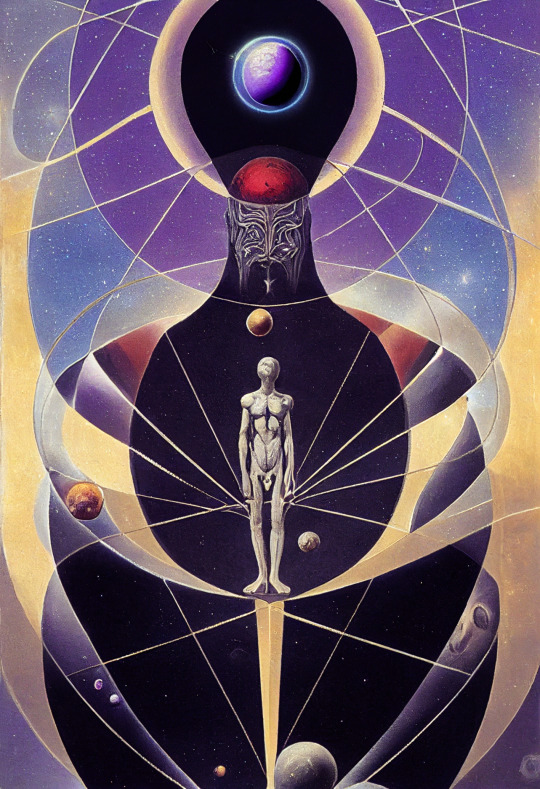
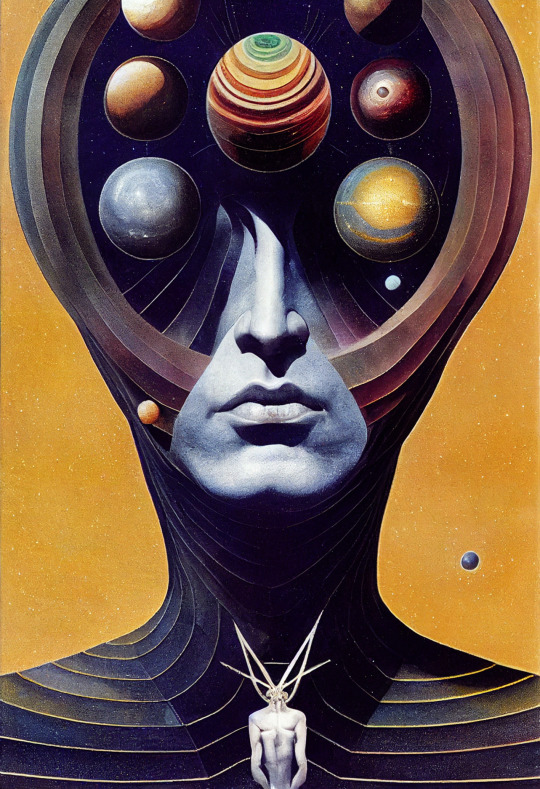
“Atma, the impersonal divine principle or the immortal element in Man, undistinguished from the Universal Spirit.”
“Atma, the “Higher Self,” is neither your Spirit nor mine, but like sunlight shines on all. It is the universally diffused “divine principle,” and is inseparable from its one and absolute Meta-Spirit, as the sunbeam is inseparable from the sunlight.”
-H.P. Blavatsky on Atman – The Higher Self
Atman
Talon Abraxas
60 notes
·
View notes
Text
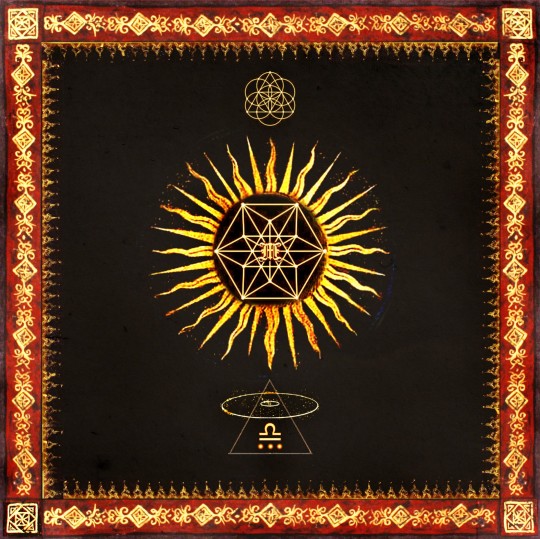

Our Universe
art by Yuko Ishii
The Universe, not only past, present, and future--which is a human and finite idea expressed by finite though--but in its totality, the Sat (an untranslatable term), the absolute being, with the Past and Future crystallized in an eternal Present, is that Thought itself reflected in a secondary or manifest cause.
--H.P. Blavatsky, The Secret Doctrine, Vol. 1 of 4
Below: “Book of the Sun”
art by Yuko Ishii
17 notes
·
View notes
Text
WHO IS LUCIFER?
“Lucifer,” is the pale morning-star, the precursor of the full blaze of the noon-day sun—the “Eosphoros” of the Greeks. It shines timidly at dawn to gather forces and dazzle the eye after sunset as its own brother ‘Hesperos’—the radiant evening star, or the planet Venus. No fitter symbol exists for the proposed work—that of throwing a ray of truth on everything hidden by the darkness of prejudice, by social or religious misconceptions; especially by that idiotic routine in life, which, once that a certain action, a thing, a name, has been branded by slanderous inventions, however unjust, makes respectable people, so called, turn away shiveringly, refusing to even look at it from any other aspect than the one sanctioned by public opinion. Such an endeavour then, to force the weak-hearted to look truth straight in the face, is helped most efficaciously by a title belonging to the category of branded names.
[…]
So deeply rooted, indeed, is this preconception and aversion to the name of Lucifer—meaning no worse than “light-bringer” (from lux, lucis, “light,” and ferre “to bring”).
|||||||||||||||||||||||||||||||||||
QUEM É LÚCIFER?
“Lúcifer” é a pálida estrela da manhã, a precursora do brilho total do sol do meio-dia — o “Eosphoros” dos gregos. Ela brilha timidamente ao amanhecer para reunir forças e deslumbrar os olhos após o pôr do sol como seu próprio irmão ‘Hesperos’ — a radiante estrela da noite, ou o planeta Vênus. Não existe símbolo mais adequado para o trabalho proposto — o de lançar um raio de verdade sobre tudo o que está oculto pelas trevas do preconceito, pelos equívocos sociais ou religiosos; especialmente por aquela rotina idiota da vida, que, uma vez que uma determinada ação, uma coisa, um nome, tenha sido marcado por invenções caluniosas, por mais injustas que sejam, faz com que as pessoas respeitáveis, assim chamadas, se afastem, tremendo, recusando-se até mesmo a olhar para isso de qualquer outro aspecto que não aquele sancionado pela opinião pública. Tal esforço, portanto, de forçar os fracos de coração a encarar a verdade de frente, é ajudado de forma mais eficaz por um título pertencente à categoria de nomes marcados.
[…]
Tão profundamente enraizado, de fato, é esse preconceito e aversão ao nome de Lúcifer – que significa nada pior do que “portador da luz” (de lux, lucis, “luz” e ferre, “levar”).
-
ℹ️“WHAT’S IN A NAME?” — LUCIFER
Edited by H.P. BLAVATSKY and MABEL COLLINS
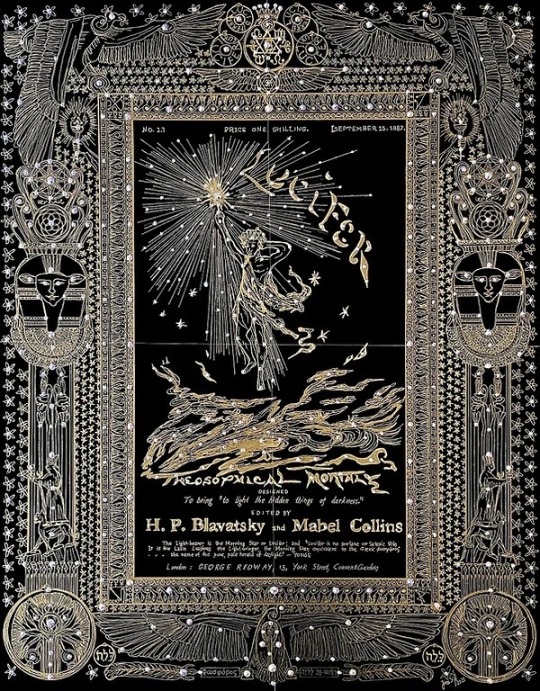
9 notes
·
View notes
Text

William Fields (American, 1940) - H.P. Blavatsky (Helena Petrovna) (2018)
151 notes
·
View notes
Text

H.P. Blavatsky, from The Secret Doctrine
Text ID: The primitive symbol of the serpent symbolised divine wisdom and perfection, and had always stood for psychical regeneration and immortality.
#h.p. blavatsky#helena blavatsky#the secret doctrine#quote#russian literature#theosophical literature#theosophy#lit#miscellanea#alchemy#/psychical regeneration/ ...#need that.#αἰνελένη
500 notes
·
View notes
Text

“the dreamless sleep” — The Secret Doctrine, Helena Petrovna Blavatsky
#literature#bibliophile#helena petrovna blavatsky#h.p. blavatsky#upload#quotes#lit#literary#russian literature#russian writers#dream#dreamless#words#occultism#occult#psychology#higher self#Еле́на Петро́вна Ган#philosophy#philosopher#medium#helena blavatsky
11 notes
·
View notes
Quote
Before the soul can see, the Harmony within must be attained, and fleshly eyes be rendered blind to all illusion.
Before the soul can hear, the image (Man) must be deaf to both the roar and the murmur, both the wild trumpeting of the elephant and the buzzing of the golden firefly.
Before the soul can understand and remember, it must be united with the One who speaks in silence, as the shape after which he shapes the clay is united with the potter's mind.
Then the soul will hear, and will remember.
And to the inner ear the Voice of Silence will speak.
H.P. Blavatsky
22 notes
·
View notes
Text
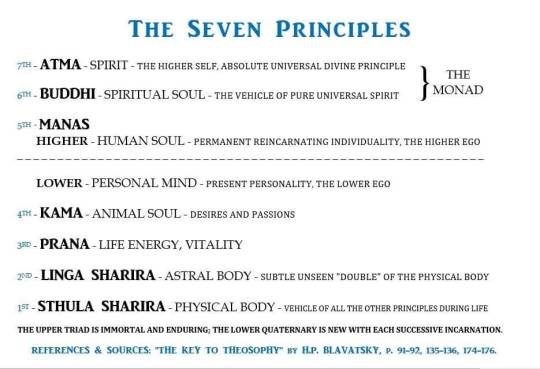
The sevenfold nature of the human being, as taught and defined in Theosophy.
You can discover more at www.BlavatskyTheosophy.com. Visit the "Articles" page (http://blavatskytheosophy.com/articles/) for the complete listing of over 200 articles relating to all aspects of Theosophy and the Theosophical Movement.
Those who may be wondering about the glaring differences between the way the Seven Principles are shown in this picture and the way they are explained in later "Theosophical" teachings after the time of HPB and William Q. Judge can find out more about this in the articles listed under the section "Pseudo-Theosophy Revealed."
We prefer to study and apply Theosophy the way that THE MASTERS chose to give it to the world, through the only one they ever called their "Direct Agent" - H.P. Blavatsky, rather than the way it was altered, distorted, and rewritten by self-proclaimed clairvoyants and Liberal Catholic "bishops."
"The terminology, introduced fifteen years ago in the T.S. [i.e. Theosophical Society] is the true one, … This terminology could not be modified, at this hour, without the risk of introducing in Theosophical teachings a chaos as deplorable as it is dangerous for their clarity." (H.P. Blavatsky, article "A Signal of Danger")
10 notes
·
View notes
Text
Theosophists are wild. They'll claim that there is only one Capital-T Truth that can only be found through forced syncretism and psychic channeling, and in the same breath, tell you that Theosophy has no dogma and can be pursued without compromising your existing religious beliefs.
0 notes
Text

"The radical unity of the ultimate essence of each constituent part of compounds in Nature - from Star to mineral Atom, from the highest Dhyani-Chohan to the smallest infusoria, in the fullest acceptation of the term, and whether applied to the spiritual, intellectual, or physical worlds - this is the one fundamental law in Occult Science."
Nature as the true basis for religion. H.P. Blavatsky
56 notes
·
View notes